We hereby publish an inofficial translation of an article published on A Nova Democracia, that has been sent to us.
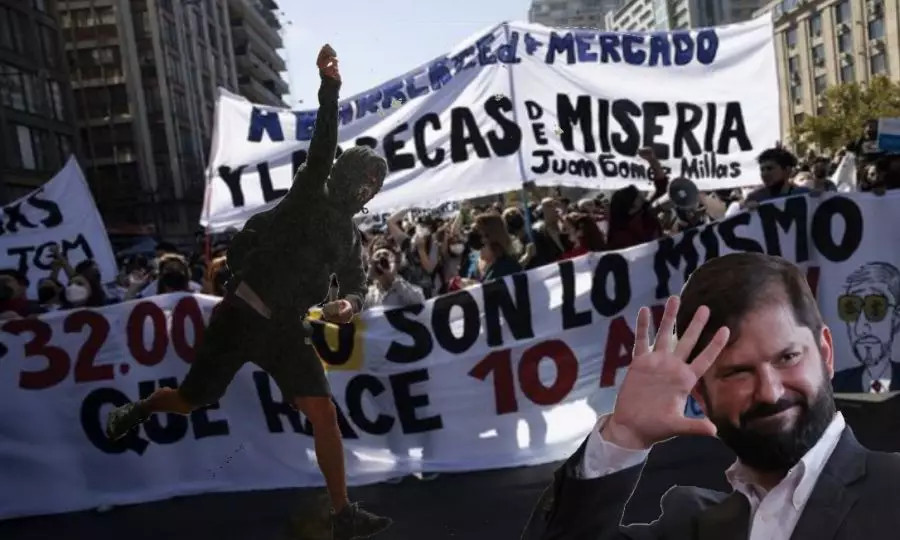
Boric's opportunistic government fails to appease the growing and inevitable popular rebellion in Chile. Photo: AND Database
Five months after Chile's opportunist President Gabriel Boric took office, several protests shook the country against the reactionary and anti-people measures promoted by the young offspring of Chilean opportunism and revisionism. In the cities, street vendors rose up against the repression by police officers carrying out an operation to eradicate street vending in the capital Santiago. Protests by students and education workers denounced the scrapping of universities, the terrible working conditions, low wages and tuition fees in public universities, demanding the release of political prisoners from the 2019-2020 demonstrations. In the countryside, The Mapuche mobilized against the domination of the latifundia and the military intervention in the center-south region of the country, decreed in 2021 and extended by Boric.
Street vendors (Camelôs) denounce operation to eradicate street vending
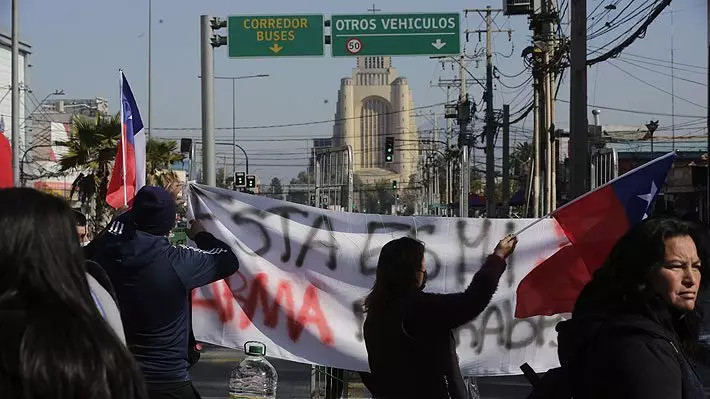
Street vendors denounce Boric’s and Hassler's operations. Photo: El Mercurio
On August 8th, 9th and 10th, street vendors in Meiggs and Maipú, communes of Santiago protested against the destruction of their workplaces and demanded the right to work. Barricades were erected and streets were blocked by rebelling workers. The police operation took place as part of a project promoted by the old Chilean state that demagogically seeks to "fight crime". The operations against street vendors, which prevent them from making a living, are taking place especially in the capital city of the country, by order of the reactionary and opportunist mayor Irací Hassler, affiliated to the revisionist Communist Party of Chile. In total 13 demonstrators were arrested by the forces of repression.
The demonstrations began on August 8th, when the street vendors, upon arriving to work, were confronted with more than one hundred police officers blocking the places where the street vendors normally erect their "blue awnings" (as the street vendors' stalls are known in Chile). In anger over the ban on their right to work, the workers blocked ‘Avenido Libertador Bernardo O'Higgins’ in Meiggs. The protest continued until San Alfonso, where another barricade was erected. The street vendors demanded that the reactionary and opportunistic mayor of Santiago, Irací Hassler, remove the troops from the street and give the vendors permission to put up their stalls. Three people were arrested by the repressive forces of the old Chilean state.
In Maipú, demonstrations took place for three consecutive days, on August 8th, 9th and 10th. The protests were concentrated in the Plaza de Maipú and barricades were erected at the intersection of Pajaritos and 5 de Abril. Police detained at least 10 workers demanding the right to market their goods. Banners with the slogans “This is my way of working“ and “We are merchants, not delinquents“ were erected by the workers.
Irací Hassler and Gabriel Boric's project to eradicate street vendors
The operations against street vendors are part of a project against commerce (seen as "illegal" by the reactionary government) that is being promoted by the Municipality of Santiago. Manuel Monsalve, Undersecretary of the Interior of Boric's opportunist government is also a participant in this project.
The operation took place in Maipú, Meiggs and in metro stations such as ‘Central‘, ‘Unión Latinoamericana‘ and ‘Universidad de Santiago‘, all located in Santiago. According to the reactionary Manuel Monsalve, there will also be interventions in around five thousand other places. A police camp has been set up in Maipú, where 170 police officers will be stationed for 30 days, preventing the masses from working in the area during this period.
The operation to eradicate street vendors promoted by Hassler has the full backing of the opportunist Boric, who has unleashed war on street vendors since he took over the management of the old Chilean state. In late May of this year, Boric conducted an operation to evict street vendors in Santiago. The operation left several people injured due to the clashes that occurred between the street vendors who returned daily to their place of work and the repressive forces. In total, around 255 workers have been arrested by Irací Hassler’s and Gabriel Boric’s repressive forces.
The operations of the Boric government represent an increase in the repression of street vendors compared to his predecessor, the reactionary Sebastián Piñera. Between January and May of this year, 18,226 interventions were carried out against street vendors, around 7,000 more than during the same period one year before.
The repression unleashed against street traders also has the strong support of sectors of the Chilean big bourgeoisie. In May, the agro-industrial landowner Juan Sutil, president of the Confederation of Production and Commerce (CPC) of Chile stated that Boric's operations are "the beginning of a work that has to be done throughout Chile.“ In agreement, the opportunist president stated that the operation would "move forward" and that "it is something we do precisely with this perspective, to recover public spaces [...] to enforce the rule of law and the law"
The eradication project has served to carry on the reactionary war against the people. Militarizing Chilean society, with thousands of troops in thousands of points in the big cities, the Boric government seeks to terrorize the workers and prevent their just rebellion against the precarious living conditions. All this under the false pretext of "fighting illegal trade" and combating "irregular" street vendors.
Students and education workers make the opportunist government tremble
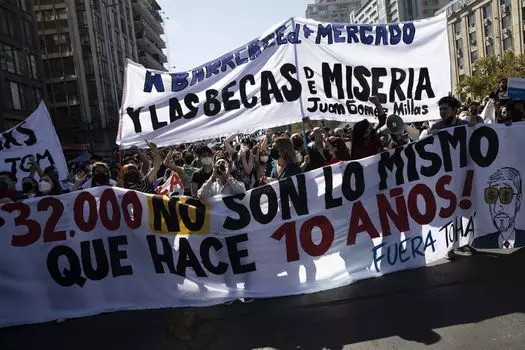
Students letting opportunist Boric tremble. Photo: EFE/Alberto Valdés
Since the first month of the stillborn opportunist government of Gabriel Boric, students and education workers have been denouncing the situation in the country's universities. On March 11th, students from several institutions demanded the cancellation of student debts from the State Guaranteed Credit (CAE, a program similar to Fies in Brazil), an end to tuition fees in public schools and an increase in scholarships from the National School Aid and Scholarship Board (Junaeb), some of which have not been adjusted for 10 years. Added to these agendas was the demand for the immediate release of political prisoners from the 2019 and 2020 demonstrations in Chile.
The demonstration was repressed by the police and the demonstrators bravely resisted the repression. One student was shot by a bullet fired by a carabinero (as police officers are called in Chile) and had to be hospitalized.
In April and May, as reported by AND, high school and university students occupied several educational institutions and mobilized, denouncing the scrappy conditionsof the buidings and demanded more investments. On May 27, a massive student march was repressed by the police, to which the masses responded with stones and Molotov cocktails. At the University of Chile, students and workers declared a strike against outsourcing and for wage increases. Already at the University of Santiago de Chile, in July, the cleaning staff and gardeners carried out a strike and a demonstration together with the students to demand better working conditions and overtime pay. And in August, at the University of Austral, around a thousand workers joined the strike of the teachers, who have been mobilizing for three weeks. The education workers demand a salary increase equivalent to the increase of the Consumer Price Index (IPC) and the return of employment benefits.
Mapuche people intensify actions amid repression by opportunist government
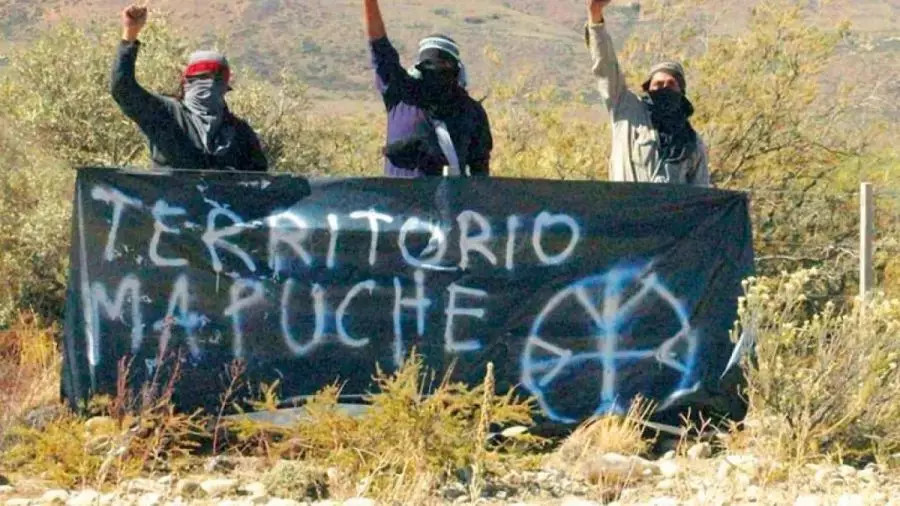
Indigenous Mapuche people are not afraid of Boric's military intervention. Photo: Reprodução
While in the cities, the old Chilean state is making life difficult for street vendors and education workers, in the countryside, state terrorism is being perpetrated against peasant masses and indigenous peoples, especially the Mapuche people. The Mapuche indigenous people have been fighting for years a hard struggle to reconquer their land, especially in the Araucanía region, which belonged to the Mapuche indigenous people before the Spanish colonization of the Americas.
In 2021, fearful of the advance of the indigenous struggle, the reactionary former president of Chile, Sebastián Piñera, decreed a State of Emergency in the south-central region of the country. The decree classified the regions as ‘conflict areas‘ and mobilized hundreds of soldiers, helicopters and armored cars to four zones in the southern regions of BioBio and Araucanía. The Chilean army forces then began to act together with the carabineros and gunmen hired by the big landowners to repress the peasant and indigenous masses, in a situation very similar to the "Law and Order Guarantee" decrees applied in Brazil against peasants in the struggle for land or very massive demonstrations in urban centers.
Since taking office as President of Chile, Boric, who in his years as a deputy visited Mapuche areas and in the presidential campaign stressed the importance of "dialogue", has continued the militarization of the area and increased the repression against the indigenous people. On May 16th, Gabriel Boric authorized the mobilization of military troops to assist the police in the repression. On May 30th of the same month, when the military intervention was coming to an end, Boric decided to extend it for fifteen days. Since then, the opportunist appealedto the Congress multipletimes to maintain the militarization of the southern areas of the country.
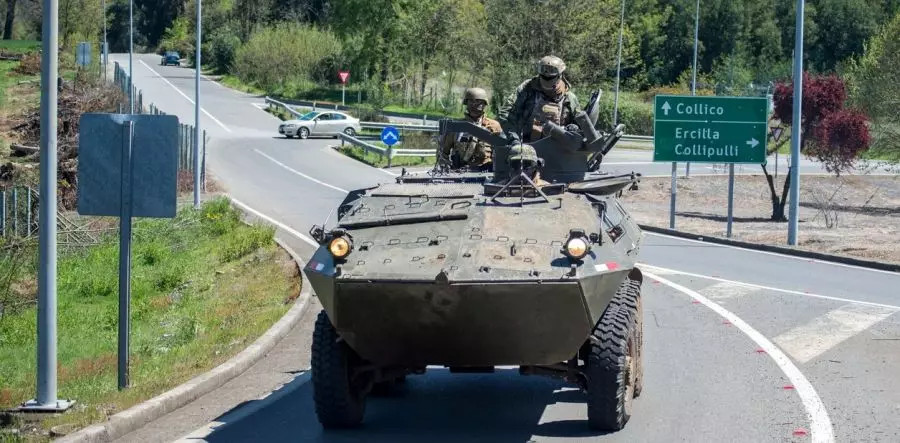
Chilean military commits terror in the countryside on the orders of Gabriel Boric. Photo: EFE
The Mapuche people, on the other hand, have not been carried away by the illusions of opportunism and have intensified their actions against the big landowners and the old state throughout 2022. In the last few weeks alone, the ‘Coordinadora Arauco-Malleco’ (CAM) has claimed several attacks on agribusiness machinery, like the burning of an excavator belonging to the Covilli company in Lumaco commune, and the burning of machinery and trucks from the Antumapu forestry company in Arauco commune. At the 9th of August already 54 attacks carried out by the Mapuche have been recorded this year, while 55 attacks were carried out in the year 2021 and 28 in 2020.
Opportunist Gabriel Boric: from false defender to open enemy of the people
The mask of "defender of the people" that Boric used (when he was active in the popular movement as an electoral opportunist) to deceive every sector that is now mobilizing in Chile is falling. In 2016, in two different cases of repression of street vendors, Boric gave empty statements censuring the repressive stance of the old Chilean state towards workers, a practice that he now perpetuates. In relation to students, Boric used, during the campaign, his past as a student "activist" and president of the Student Federation of Chile to position himself as close to the education sector.
In his period as a yellow "activist," however, Boric played a key role in appeasing the protests and pointing the way out of the rebellion through the "institutional path" and "new constitution." The bureaucratic way, which, far from solving these problems, only strengthens the obsolete structure of the old Chilean State, a repressive apparatus against the masses at service of the Chilean ruling classes, but with a new appearance.
Finally, as for the Mapuche, Boric visited territorial units of this people in 2016 and painted himself multiple times as opposed to the militarization of these areas and open to dialogue, also including the CAM. (Coordinadora Arauco-Malleco, militant Organisation of Mapuche, annotation by the translator)
Now, Boric evicts and imprisons street vendors who work without being "properly regulated" by the old State; maintains the exploitation of education workers and the scrapping and privatization of universities; and intensifies the military intervention in Mapuche areas in the center-south of the country. Under his leadership, brutal repression is planned for each of these sectors in case of a popular rebellion, either by the use of carabineros or the Chilean armed forces. The masses, on the other hand, in the countryside and in the city, continue to fight for their most basic rights.
